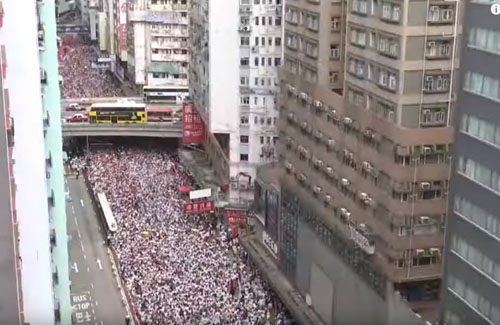by WorldTribune Staff, June 10, 2019
More than one million people jammed the streets of Hong Kong on June 9 to protest the Chinese government’s proposed law that would allow the regime of supreme leader Xi Jinping to extradite people from Hong Kong to stand trial in the mainland.
Organizers said it was the largest rally challenging China’s authority over the city since Great Britain ceded control in 1997.

Veteran democracy activist Martin Lee called the rally the “last fight” for Hong Kong.
Reporting for the Wall Street Journal, Natasha Khan noted that “Lee was on the drafting committee of the Basic Law, the city’s mini constitution that enshrined people’s freedoms and rights until 2047. He said there was deliberately no extradition clause in that agreement because the two jurisdictions were too different. Under the new law, Beijing could extradite Hong Kong residents and foreigners on trumped-up charges.”
Critics say the proposed law could be abused to target political dissidents and would expose citizens to the mainland’s more opaque legal system, where detainees could be unfairly jailed and abused, Khan’s report said.
“Foreign business groups and diplomats have warned the extradition proposal poses a threat to the rule of law that helped Hong Kong prosper for decades as an international financial center and base for foreign companies, arguing it breaks China’s promise to preserve the city’s relative autonomy until at least 2047,” Khan wrote.
The estimated turnout on June 9 was double that of a similar protest in 2003, when 500,000 people marched against proposed national-security legislation that was later withdrawn by the government.
“Unlike then, however, Beijing now has a much tighter grip on the city and has increasingly moved to silence opposition voices,” Khan wrote.
Hong Kong’s government said after the protest march that it will press ahead with the extradition bill, which is due for a second reading in the legislature on June 12.
Officials said the law is needed so Hong Kong doesn’t become a refuge for criminals, the proposal having been spurred by a case of a man who allegedly murdered his girlfriend in Taiwan in February 2018 and fled back to Hong Kong, but couldn’t be extradited because the jurisdictions don’t have an agreement.
Public opposition to the extradition bill has persisted even after the city’s leader, Carrie Lam, watered down the proposal slightly by narrowing the number of offense categories liable to extradition to 37 from 46.
“This is a crisis for Carrie Lam and her administration,” said Antony Dapiran, a lawyer and author of a book on dissent in the city. “The government can’t be seen to be caving immediately in the face of protest, but how can they just ignore one million people on the streets?”
A U.S. State Department official said Washington is “closely monitoring and concerned by the Hong Kong government’s proposed amendments” to the extradition law. “Continued erosion of the ‘One country, two systems’ framework puts at risk Hong Kong’s long-established special status in international affairs.”
Khan noted that the protest saw “Many dressed in white — the official color for the march — and held red placards calling for the extradition bill to be withdrawn and for Ms. Lam to step down.”
Kitty Wong, a 38-year-old teacher who, like many demonstrators, was joining a protest for the first time, gestured to her two children, ages 8 and 9, and said “I needed to let my voice be heard. We need to defend our home for the next generation.”
“Even if the chance of a withdrawal is 50-50, we decided to come out today because it was the right thing to do,” said Jason Y. Ng, convener of the Progressive Lawyers Group.
“In the face of such overwhelming opposition to the bill, the government will be taking a big risk to pass it,” said Margaret Ng, a lawyer and former legislator. “If they decide to ram it down people’s throats, they will lose all legitimacy.”
Intelligence Brief __________ Replace The Media
